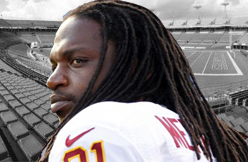Many were surprised when Washington re-signed strong safety Brandon Meriweather to a one-year deal following the 2013 season.
Jim Haslett’s defense desperately needed an upgrade at safety. But after Washington’s front office concluded the long-term solution wasn’t available on the free-agent market, the team brought Meriweather back on a one-year deal that suggested he was a stop-gap measure for 2014 — a hedge against the possibility that Phillip Thomas wouldn’t be ready for starting duty after missing his rookie season with a Lisfranc injury.
It wasn’t bad thinking. Meriweather proved more durable than Thomas, who struggled with injury throughout, and more capable than Bacarri Rambo, the other backup in line to challenge for his job, finishing with 55 tackles, three sacks and three forced fumbles.
But for the third consecutive year in Washington, Meriweather failed to log a full season for familiar reasons. He missed the first two games because he’d been suspended by the NFL for an illegal hit on Baltimore’s Torrey Smith during Washington’s loss in its third preseason game. And he missed the last four with a sprained big toe, finishing the year on injured reserve.
Heading into his ninth NFL season, Meriweather is a free agent once again. And for several reasons — some familiar, others new — it’s difficult to picture Washington bringing back the secondary’s aggressive, hard-hitter once more.
Here’s why:
• Meriweather hasn’t managed to play a full NFL season since 2010 because of various rules infractions and ailments. He missed all but one game of the 2012 season, his first in Washington, with knee injuries. In 2013 he was slapped with a two-game suspension for illegal hits against Chicago but managed to get it reduced to a one-game ban.
• Washington’s short-term solution at safety in 2014 — re-signing Meriweather and adding veteran Ryan Clark — merely forestalled a problem rather than fixed it. Though Clark provided leadership and stability on a defensive backfield that needed it, the unit gave up far too many big plays, whether because of missed assignments or a lack of speed. With Meriweather and Clark now 31 and 35, respectively, Washington probably needs two new starting safeties.
• A new defensive coaching staff is in charge, with Haslett replaced by former San Diego Chargers linebackers coach Joe Barry. Gone too is defensive backs coach Raheem Morris. So continuity among personnel isn’t necessarily a virtue as Barry goes about re-making a defense that gave up 27.4 points per game (tied for 29th in the NFL) and 357 yards per game (20th). Moreover, Washington’s new general manager, Scot McCloughan, has a record of favoring big, rangy defensive backs; Meriweather is 5-11, 197. McCloughan also prefers developing young players through the draft.
• Finally, while aggression is essential for safeties, Meriweather’s unchecked zeal has earned him a reputation as a dirty player. With the NFL cracking down on contact by defensive backs, Meriweather vowed last fall to lower his strike zone and lead with his shoulder rather than the crown of his helmet. But amid the explosiveness of live games, checking a reflex is difficult to do. Meriweather’s helmet-to-helmet hit on Smith during the preseason resulted in his sixth infraction for an illegal hit in his pro career.
Given his history, Meriweather has lost any benefit of the doubt among NFL officials. That was evident when the NFL denied his appeal of the two-game suspension to start the 2014 season, standing firm rather than reducing it.
The suspension cost Meriweather dearly. His forfeited checks for missing the Sept. 7 season opener at Houston and Sept. 14 home opener against Jacksonville totaled $100,588.
But the suspension cost the Redskins dearly, as well.
Rambo filled in for Meriweather and gave up a 76-yard touchdown in the loss at Houston and took a bad angle that led to a 69-score against Jacksonville. Rambo was waived once Meriweather was cleared to play.
Although Meriweather’s services could likely be had for a reasonable price, that price is likely too high for Washington’s new decision-makers. A struggling defense in need of a new culture and greater discipline and physicality can’t afford the risk Meriweather represents.

(washingtonpost.com)



